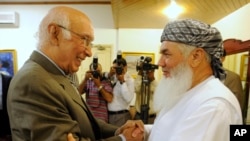ISLAMABAD —
A top Pakistani official says he believes a peace deal between Afghanistan and the Taliban is possible provided the government in Kabul shows flexibility.
The Taliban leadership is believed to be hiding in Pakistan and is allegedly guiding the Afghan insurgency with the support of elements within the Pakistani military. Islamabad denies involvement, although it had helped the Islamist group to rise to power in Kabul in the 1990s.
Afghan President Hamid Karzai has long pressed Pakistan to use its influence with the Taliban to bring them to the table for talks, but the insurgent group is opposed to negotiations until foreign troops leave the country.
There are growing worries Afghan security forces may not be able to prevent the Taliban from recapturing power after 2014 when most international troops will have withdrawn from the country.
Speaking Sunday in Islamabad, Pakistani National Security and Foreign Policy Advisor Sartaj Aziz indicated a peace deal in Afghanistan is still within reach.
“The Taliban has already established its rule in some Afghan districts, but it is Pakistan’s assessment the group will not be able to regain control of the whole country” after the foreign troops stage their planned withdrawal, Aziz said.
The Pakistani advisor said there are about 350,000 Afghan security forces and the anti-Taliban northern alliance has also grown stronger, therefore, the Taliban would also be looking for a way out to end the conflict through the process of political reconciliation. He urged the Afghan government to show flexibility to come up with an offer that would encourage the Taliban to join the peace process.
Meanwhile, Aziz indicated the option of using military force to deal with the problem of militancy in Pakistan is kept open. He warned the militancy has become an “existential threat” to Pakistan.
“[It is a] very complex issue and there is no simple answer to it because we have had several agreements in the past [with the Pakistani Taliban] and they were not upheld," Aziz said. "They did not fulfill their promise and whenever you want a dialogue it should be from a position of strength and not a position of weakness. I have a feeling that at least in the last seven months we have started addressing this thing, not in an ad hoc fashion like dialogue, but a very consistent policy of a counterterrorism strategy.”
A four-member Pakistani government delegation last week initiated a new round of peace talks with a group of public figures the Taliban nominated as its negotiating team.
The Taliban leadership is believed to be hiding in Pakistan and is allegedly guiding the Afghan insurgency with the support of elements within the Pakistani military. Islamabad denies involvement, although it had helped the Islamist group to rise to power in Kabul in the 1990s.
Afghan President Hamid Karzai has long pressed Pakistan to use its influence with the Taliban to bring them to the table for talks, but the insurgent group is opposed to negotiations until foreign troops leave the country.
There are growing worries Afghan security forces may not be able to prevent the Taliban from recapturing power after 2014 when most international troops will have withdrawn from the country.
Speaking Sunday in Islamabad, Pakistani National Security and Foreign Policy Advisor Sartaj Aziz indicated a peace deal in Afghanistan is still within reach.
“The Taliban has already established its rule in some Afghan districts, but it is Pakistan’s assessment the group will not be able to regain control of the whole country” after the foreign troops stage their planned withdrawal, Aziz said.
The Pakistani advisor said there are about 350,000 Afghan security forces and the anti-Taliban northern alliance has also grown stronger, therefore, the Taliban would also be looking for a way out to end the conflict through the process of political reconciliation. He urged the Afghan government to show flexibility to come up with an offer that would encourage the Taliban to join the peace process.
Meanwhile, Aziz indicated the option of using military force to deal with the problem of militancy in Pakistan is kept open. He warned the militancy has become an “existential threat” to Pakistan.
“[It is a] very complex issue and there is no simple answer to it because we have had several agreements in the past [with the Pakistani Taliban] and they were not upheld," Aziz said. "They did not fulfill their promise and whenever you want a dialogue it should be from a position of strength and not a position of weakness. I have a feeling that at least in the last seven months we have started addressing this thing, not in an ad hoc fashion like dialogue, but a very consistent policy of a counterterrorism strategy.”
A four-member Pakistani government delegation last week initiated a new round of peace talks with a group of public figures the Taliban nominated as its negotiating team.
